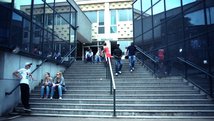Education, training and languages
Overview
Education
Education and teaching can help contribute to a sense of community among young people, and should be adapted to develop closer cross-border cooperation.
By exploiting the multicultural potential or cross-border spaces, cross-border cooperation in the field of education offers young people the necessary skills to face intercultural challenges not only in a professional context but also in all aspects of social life, first of all at a local scale, but potentially with a much larger scope.
Cross-border cooperation in the field of education is organised at different levels:
- As early as nursery school, it is possible for schoolchildren in border areas to learn the shared language of the cross-border community according to different teaching systems. This is the case for so-called “regional languages” in France: Basque, Occitan, Catalan...
- Similarly, at primary level, lessons are sometimes taught in the neighbouring country’s language, and there are even bilingual schools in existence. In general, proximity affords the opportunity for cultural events and school exchanges aimed at gradually discovering the neighbouring culture.
Example: the Perthus cross-border school - At secondary level, aside from bilingualism, higher level language lessons can be implemented. In order to promote the neighbouring language, it can be presented at exams on the same terms as other subjects within certain programmes.
There are also bi-national or even cross-border high schools, for example the Germano-Luxembourgish Schengen Lyzeum in Perl.
It should be noted that in bi-national sections of certain French lycées, pupils follow a specific curriculum drawn up with a partner country. These countries are: Germany (AbiBac); Spain (BachiBac); and Italy (Esabac). A pupil who successfully completes such a programme is awarded both the French general baccalaureate and the corresponding diploma from the neighbouring country concerned. - In higher education, at university level, at first in a limited and dispersed manner and by specialised discipline, DESS programmes (one-year French post-graduate diploma)and then Master’s degrees have been created in the context of the harmonisation of European higher education courses. Numerous European programmes such as Erasmus (for higher education) or Leonardo (for vocational training and education) also encourage cross-border mobility, although this is not limited to cross-border spaces.
Examples of cross-border cooperation in the field of higher education include:
– University of the Greater Region
– Franco-Belgian cross-border "Université Métropolitaine"
– EUCOR: Upper Rhine University Network
– NovaTris: cross-border skills centre of the University of Haute-Alsace (UHA), element of consolidation of the EUCOR network


